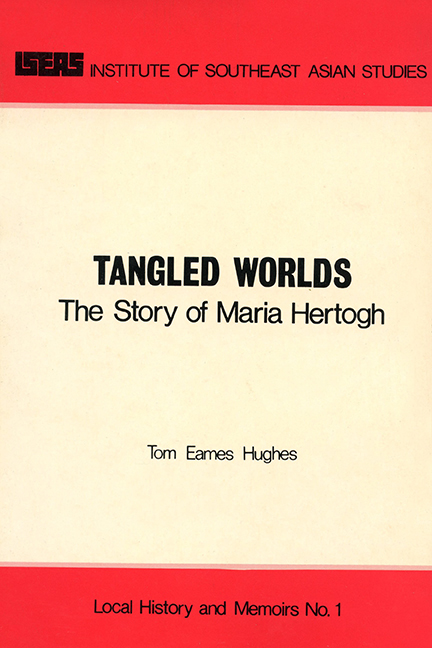Book contents
- Frontmatter
- INTRODUCTION AND ACKNOWLEDGEMENTS
- A NOTE ON NOMENCLATURE
- Contents
- I HOW IT BEGAN IN JAVA, UP TO 1942: Maria's birth and parentage; parents' background; adoptions; Hertogh children; Che Aminah
- II MARIA COMES UNDER THE CARE OF CHE AMINAH, 1942: Mrs. Hertogh's version; Che Aminah's version; court discounts both; was Mrs. Hertogh interned?; date of Maria's transfer to Che Aminah
- III MARIA: 1942 TO 1950: KAMPONG TO COURT
- IV MARIA IN SINGAPORE: Placed in care of Social Welfare Department pending result of court proceedings; custody awarded to parents: April/May 1950
- V PUBLIC INTEREST QUICKENS: LEAVE TO APPEAL GIVEN
- VI MARIA AT YORK HILL: APRIL/JULY 1950
- VII THE APPEAL JUDGEMENT, JULY 1950
- VIII MARIA'S MARRIAGE, 1 AUGUST 1950
- IX LEGAL PROCEEDINGS RESUMED, AUGUST/SEPTEMBER 1950
- X FOUR SMOULDERING MONTHS, AUGUST/NOVEMBER 1950
- XI THE JUDGEMENT OF MR. JUSTICE BROWN, 2 DECEMBER 1950
- XII THE LAST TEN DAYS: 2 TO 12 DECEMBER 1950
- XIII 11, 12, 13 DECEMBER. RIOTS – THE END OF ONE AND MANY LIVES
- XIV EPILOGUE: MARIA IN HOLLAND, FROM DECEMBER 1950
- NOTE ON SOURCES
- THE AUTHOR
III - MARIA: 1942 TO 1950: KAMPONG TO COURT
Published online by Cambridge University Press: 21 October 2015
- Frontmatter
- INTRODUCTION AND ACKNOWLEDGEMENTS
- A NOTE ON NOMENCLATURE
- Contents
- I HOW IT BEGAN IN JAVA, UP TO 1942: Maria's birth and parentage; parents' background; adoptions; Hertogh children; Che Aminah
- II MARIA COMES UNDER THE CARE OF CHE AMINAH, 1942: Mrs. Hertogh's version; Che Aminah's version; court discounts both; was Mrs. Hertogh interned?; date of Maria's transfer to Che Aminah
- III MARIA: 1942 TO 1950: KAMPONG TO COURT
- IV MARIA IN SINGAPORE: Placed in care of Social Welfare Department pending result of court proceedings; custody awarded to parents: April/May 1950
- V PUBLIC INTEREST QUICKENS: LEAVE TO APPEAL GIVEN
- VI MARIA AT YORK HILL: APRIL/JULY 1950
- VII THE APPEAL JUDGEMENT, JULY 1950
- VIII MARIA'S MARRIAGE, 1 AUGUST 1950
- IX LEGAL PROCEEDINGS RESUMED, AUGUST/SEPTEMBER 1950
- X FOUR SMOULDERING MONTHS, AUGUST/NOVEMBER 1950
- XI THE JUDGEMENT OF MR. JUSTICE BROWN, 2 DECEMBER 1950
- XII THE LAST TEN DAYS: 2 TO 12 DECEMBER 1950
- XIII 11, 12, 13 DECEMBER. RIOTS – THE END OF ONE AND MANY LIVES
- XIV EPILOGUE: MARIA IN HOLLAND, FROM DECEMBER 1950
- NOTE ON SOURCES
- THE AUTHOR
Summary
Maria lived in Java with Che Aminah from the turn of the year in 1942/43 until some time after the end of the Japanese occupation.
When Maria was handed over, Che Aminah was living in Bandoeng. But when Mrs. Hertogh's mother went to see her at Mrs. Hertogh's request after Mrs. Hertogh had been interned, she found the house empty.
Che Aminah and Maria had apparently gone to Batavia. Che Aminah told the Social Welfare Department on 24 April 1950 that they later moved back to Bandoeng “because of Bertha. If I were found with a Dutch child, the terrorists would have killed me.”
Maria was known to Malays as “Puteh”, the fair one: she was conspicuous and Che Aminah's claim that the care of Maria was at great personal risk to herself had some basis.
Back in Bandoeng, Che Aminah, making use of a skill acquired during her long residence in Japan, got a job as an interpreter with the Japanese military police.
She avoided trouble during the occupation but continued to be in fear of “terrorists” and, as travel became easier in 1947, she took Maria, via Singapore, to live in Kemaman, in the state of Trengganu in the Federation of Malaya, where she had relatives. She claimed that leaving Java meant the loss of a substantial amount of property which she estimated as being worth about S$50,000.
At Kemaman, Maria attended the Chukai Malay Girls School for more than two years. She wore Malay clothes. She could not use a knife and fork. She learnt the Quran.
Sergeant Hertogh, Maria's father, was sent as a prisoner of war from Java to Japan, where he was released in 1945.
He returned to Java and rejoined his wife. They said they enquired about Maria but could not find her. Eventually they returned to Holland without having been able to contact Maria or Che Aminah. They asked the Dutch authorities in Java and Singapore to try and trace the child.
- Type
- Chapter
- Information
- Tangled WorldsThe Story of Maria Hertogh, pp. 14 - 17Publisher: ISEAS–Yusof Ishak InstitutePrint publication year: 1980

